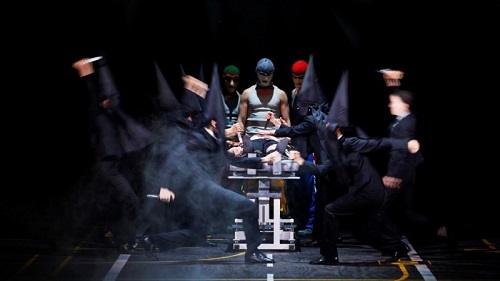 Germany Gluck: Orfeo ed Euridice, Staatskapelle Berlin and Staatsopernchor/Alessandro de Marchi (conductor), Schiller Theatre, Berlin, 13.10.2016. (JMI)
Germany Gluck: Orfeo ed Euridice, Staatskapelle Berlin and Staatsopernchor/Alessandro de Marchi (conductor), Schiller Theatre, Berlin, 13.10.2016. (JMI)

Cast:
Orfeo – Max Emanuel Cencic
Euridice – Elsa Dreisig
Amore – Narine Yeghiyan
Production:
Director – Jürgen Flimm
Sets – Gehry Partners
Costumes – Florence von Gerkan
Lighting – Olaf Freese
Choreography – Gail Skrela
This staging is the work of Jürgen Flimm, who is also the Intendant of the Berlin Staatsoper. The attractive and tasteful production brings the story up to modern times. It begins in a crematorium, where Orpheus arrives with the corpse of his wife, accompanied by a number of guests who are all elegantly dressed in black. The march of Orpheus to the Underworld is preceded by tremendous opposition from the Furies, but Orpheus finally has his meeting with Euridice in a bedroom, where he resists the obvious amorous advances of his wife.
Either for musical or for dramatic reasons, the end of the opera has been changed since last spring’s performances. Then there was no happy conclusion, but it now ends with the traditional choral ‘Trionfi Amore’. To this change one must add the surprising cut of Amore’s second aria.
Daniel Barenboim, who conducted in the spring, has ceded his post in the pit to Alessandro de Marchi, and the difference is remarkable. The reviews last spring of the musical direction were enthusiastic and unanimous, but Alessandro de Marchi did not leave me with that sort of impression. He gave a correct reading, but not much more. The Staatsopernchor was excellent, although the Staatskapelle Berlin has been more impressive in the past.
Over the years I have had the occasion to see this opera in different versions, not only with regard to the music but also in vocal terms. I’ve heard Orpheus as contralto, tenor and countertenor, and I definitely prefer the contralto voice. In Berlin, both last spring and now, Orpheus has been interpreted by a countertenor.
Max Emanuel Cencic gave life to Orpheus in this production; Bejun Mehta sang the role earlier. Countertenor voices are not characterized by their beauty, which can be offset by their technical exhibitions, especially in coloratura passages in Baroque operas. But this is not the case in Gluck’s Orfeo, where there are no vocal fireworks, just pure expressive singing, almost the opposite of Baroque. Here the vocal attractiveness that a countertenor can offer is missing, even with an excellent singer such as Max Emanuel Cencic.
Soprano Elsa Dreisig left a very positive impression on the part of Euridice. She joined the Berlin Staatsoper this year after winning first prize in the most recent Operalia competition. Her voice is ample and attractive, and she is a remarkable singer with an important career ahead.
The role of Amore was rather reduced in this production, but was well played and sung by soprano Narine Yeghiyan.
José M. Irurzun
I’ve seen the both versions too, though the one with Mehta was already conducted by de Marchi.
The choir was imho TERRIBLE, slow and apathetic, the most frustrating bit was the opening of the 2nd act – it’s such a dynamic piece of music, begging for some energetic choreography and all the choir offered here was bowing their heads in a kkk-like hoods and singing as if they were falling asleep. I’ve read a critique pointing this out in Spring already (Spiegel or similar) but they didn’t improve the slightest bit. Also the accoustic in the Schiller Theater must be somehow weird – when the performers were standing in the center of the scene, they were barely heard – which makes me think, how well were the choir able to hear the orchestra… maybe this could explain the sluggish tempo of their singing…?
Also suprised you didn’t mention the overall interpretation of the story, which I really liked a lot – the depicting of the relationship between O. and E. as one where each side is kind of torturing the other and Euridice loses it first.
Agree Elsa Dreisig is absolutely superb, she was a revelation to me when I heard her in Spring.
Despite being a Cencic fan, I liked Mehta much more in the role. Cencic was not that articulated and expressive… and funny detail – at the performance I went to (13.10), he made a mistake right in the most famous aria… you guessed it, Che faro senza Euridice! :D Very funny indeed… that’s what I’m going to remember from that rather unconvincing performance.
Mehta was very good though, he’s expressive like hell in this role, how can you claim otherwise…?! (To refresh your memory, you can check his (other) performance on youtube (directed by Vaclav Luks), esp. the openings of 1st and 3rd act have proved to be tear squeezers for me).
Oh and one more thing – the performance on 13th didn’t end with the Trionfi Amore but with some melancholic instrumental piece, to which Orfeo was scattering the ashes, alone on the stage. So hardly a happy ending. I’d like to know though what that piece was… can it be from some other versions of the opera by Gluck? To me it sounded rather like a totally different piece, with a distinct solo part by a string instrument – so maybe some concerto…?